#American Society/Council of the Americas
Explore tagged Tumblr posts
Text
Justin Horowitz at MMFA:
Project 2025 advisory board members have attacked or outright called for the end of no-fault divorce, the option to dissolve a marriage without having to prove wrongdoing by a partner. Research highlighted by CNN found “no-fault divorce correlates with a reduction in female suicides and a reduction in intimate partner violence,” including “an 8 to 16% decrease in female suicides after states enacted no-fault divorce laws.” Project 2025 is backed by a nearly-900 page policy book called Mandate for Leadership, which extensively outlines potential approaches to governance for the next Republican administration, including replacing federal employees with extremists and Trump loyalists and attacking LGBTQ rights, abortion, and contraception. The Heritage Foundation’s proposals have a track record of success — the first Trump administration implemented 64% of Mandate’s policy recommendations. Project 2025 is also supported by a coalition of over 100 conservative organizations, many of which have spent years promoting critiques of no-fault divorce as “destructive” for society — or even blaming it for enabling a “culture of death.” According to a Media Matters review, at least 22 Project 2025 advisory board members have made similar comments targeting, restricting, or eliminating no-fault divorce. Additionally, MAGA and far-right media figures have pushed for the removal of no-fault divorce laws across the country, and several local Republican parties in Texas, Nebraska, and Louisiana have called for the dissolution of no-fault divorce in some capacity.
Project 2025 partner organizations, including the American Family Association, Concerned Women for America, Family Research Council, and The Heritage Foundation, have called for significant restrictions or an outright ban on no-fault divorce.
#Project 2025#Divorce#No Fault Divorce#American Family Association#AFA#American Legislative Exchange Council#American Principles Project#Center For Family and Human Rights#CFAM#Center For Renewing America#Concerned Women For America#Discovery Institute#Dr. James Dobson Family Institute#Eagle Forum#Family Research Council#First Liberty Institute#Independent Women’s Forum#The American Conservative#Claremont Institute#Turning Point USA#The Heritage Foundation
4K notes
·
View notes
Text
Big news for bird names: American Ornithological Society to replace eponyms
AOS intends to change all offensive and eponymous (named after people) common names of birds in the USA and Canada.
Renaming these species will be done with involvement of the public and overseen by a new committee made up of ornithologists, social scientists, and communications and taxonomy experts.
AOS will work with the ornithological societies of Central and South America determine who in these regions will maintain stewardship of common English names.
AOS announcement: https://americanornithology.org/about/english-bird-names-project/american-ornithological-society-council-statement-on-english-bird-names
More information under the cut.
How do bird names work? Scientific names (binomials like Zonotrichia albicollis) are set by the International Commission on Zoological Nomenclature. These names are meant to be unique, unchanging, and universally recognized. Common names, on the other hand, are more fluid. The American Ornithological Society is the recognized authority on English-language common names for North American birds, published in their annual Checklist.
The larger context. Ornithologists name birds after people to commemorate those individuals, but this create problems. What do you do when a common name is racist, or when a bird is named after someone who, frankly, sucked? AOS has changed bird names for both of these reasons already.
In 2000 AOS changes the common name of Clangula hyemalis from a racist word for Native women to Long-tailed Duck (although at the time, they denied it was because of "political correctness")
2021: AOS changes the common name of Rhynchophanes mccownii from McCown's Longspur to Thick-billed Longspur. McCown was a Confederate. The push to rename this bird was a flashpoint in the #birdnames4birds movement.
Why not decide one-by-one? Sometimes it's obvious. For example, John James Audubon was a grave-robbing, slave-owning racist; birds such as Audubon's Oriole and Audubon's Shearwater are named after him. Although the National Audubon Society has voted to keep their name ("won't someone consider the branding"), many chapters have changed their names, e.g. the Chicaco Bird Alliance. Other individuals with birds named after them are less well-known or clear-cut in how much they did or did not suck. Removing all eponyms, rather than debating who sucks on a case-by-case basis, will cut down on the arguments.
How will this actually happen? It's not yet clear. Any free-for-all-poll might result in some Birdy McBirdFaces. No timeline either. But it sounds like this really is happening!
4K notes
·
View notes
Text
In 2024, wealth concentration rose to an all-time high. According to Forbes’ Billionaires List, not only are there more billionaires than ever—2,781—but those billionaires are also richer than ever, with an aggregate worth of $14.2 trillion. This is a trend that looks set to continue unabated. A recent report from the financial data company Altrata estimated that about 1.2 million individuals who are worth more than $5 million will pass on a collective wealth of almost $31 trillion over the next decade.
Discontentment and concern over the consequences of extreme wealth in our society is growing. Senator Bernie Sanders, for instance, stated that the “obscene level of income and wealth inequality in America is a profoundly moral issue.” In a joint op-ed for CNN in 2023, Democratic congresswoman Barbara Lee and Disney heiress Abigail Disney wrote that “extreme wealth inequality is a threat to our economy and democracy.” In 2024, when the board of Tesla put to vote a $56 billion pay package for Elon Musk, some major shareholders voted against it, declaring that such a compensation level was “absurd” and “ridiculous.”
In 2025, the fight against rising wealth inequality will be high on the political agenda. In July 2024, the G20—the world’s 20 biggest economies—agreed to work on a proposal by Brazil to introduce a new global “billionaire tax” that would levy a 2 percent tax on assets worth more than $1 billion. This would raise an estimated $250 billion a year. While this specific proposal was not endorsed in the Rio declaration, the G20 countries agreed that the super rich should be taxed more.
Progressive politicians won’t be the only ones trying to address this problem. In 2025, millionaires themselves will increasingly mobilize and put pressure on political leaders. One such movement is Patriotic Millionaires, a nonpartisan group of multimillionaires who are already publicly campaigning and privately lobbying the American Congress for a guaranteed living wage for all, a fair tax system, and the protection of equal representation. “Millionaires and large corporations—who have benefited most from our country’s assets—should pay a larger percentage of the tab for running the country,” reads their value statement. Members include Abigail Disney, former BlackRock executive Morris Pearl, legal scholar Lawrence Lessig, screenwriter Norman Lear, and investor Lawrence Benenson.
Another example is TaxMeNow, a lobby group founded in 2021 by young multimillionaires in Germany, Austria, and Switzerland which also advocates for higher wealth taxation. Its most famous member is the 32-year old Marlene Engelhorn, descendant of Friedrich Engelhorn, founder of German pharma giant BASF. She recently set up a council made up of 50 randomly selected Austrian citizens to decide what should happen to her €25 million inheritance. “I have inherited a fortune, and therefore power, without having done anything for it,” she said in a statement. “If politicians don’t do their job and redistribute, then I have to redistribute my wealth myself.”
Earlier this year, Patriotic Millionaires, TaxMeNow, Oxfam, and another activist group called Millionaires For Humanity formed a coalition called Proud to Pay More, and addressed a letter to global leaders during the annual gathering of the World Economic Forum in Davos. Signed by hundreds of high-net-worth individuals—including heiress Valerie Rockefeller, actor Simon Pegg, and filmmaker Richard Curtis—the letter stated: “We all know that ‘trickle down economics’ has not translated into reality. Instead it has given us stagnating wages, crumbling infrastructure, failing public services, and destabilized the very institution of democracy.” It concluded: “We ask you to take this necessary and inevitable step before it’s too late. Make your countries proud. Tax extreme wealth.” In 2025, thanks to the nascent movement of activist millionaires, these calls will grow even louder.
#it's nice to think about but it's not going to happen anytime soon#not with this congress and president
564 notes
·
View notes
Text
Him & I | Kai Anderson
masterlist

summary: you came to kai like you were an angel sent from god. he finally met his match. you wanted to get revenge and he cleared the path
pairing: fem! reader x kai anderson
words: 2.9k
a/n: kai is everything i despise in a man yet i cannot stop thinking about him. fuck my rights i’ll make you a manwhich like the woman i’m supposed to be NOT PROOFREAD TBH

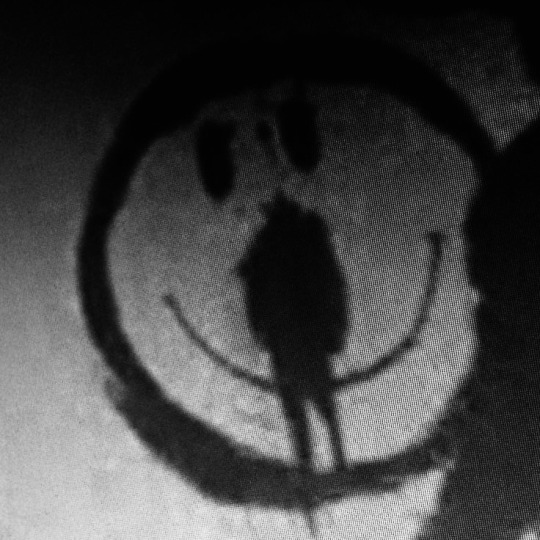

Gluttony is a sin. So is sloth. Eating an entire bag of chips was not healthy. Sitting on the couch from dawn to dusk, only getting up to relieve yourself, was not good. But who listens to God these days anyways.
knock knock
‘Be right there!’ You yelled, hoping whomever was at the door could hear you and would wait until you had mentally prepared yourself to get up from your nest. You pressed pause of Golden Girls, placed your bag of gluttony on the table and brushed the remaining crumbs on your finger on your back thigh. Thankfully you showered this morning so whomever you greeted wouldn’t be welcomed with the smell of your tiredness. It was just one of those days where doing nothing was the most satisfying for the soul. Keeping the ripples of the sea of stress at bay, hoping that the storm wouldn’t take over.
Through the small peephole of the front door you saw an unfamiliar man with kool aid blue hair in a suit who was swaying his body as he waited to face the owner. ‘Jesus christ,’ you cursed under your breath, letting your hand slide over your face. Not Jehovah witnesses again. You had told them to not come back but when life serves no purpose we mainly cling to the unimportant aspects of life and let small parts become our worst traits.
You opened the door, dropping your droopy expression and replacing it with a hostile smile. Kindness: America’s number one trait making it an aggravating society.
‘Hi,’ you grinned at him, ‘not interested.’
The man blinked at you, wrinkles on his forehead reminding you of the ripples in your soul as he breathed out a laugh. ‘You don’t even know what I was going to say, Ma’am.’
‘Call it my gift.’
‘You must think I’m in some kind of cult,’ he smiled, ‘I can assure you I’m not. My name is Kai Anderson and I was hoping I could talk to you about my plans for this town so I might be able to persuade you into voting for me to become a member of the town council.’
‘Oh.’
‘Can I come in?’
‘I suppose…’ You were unsure but the thought of your pepper spray in the kitchen drawer made you feel safer, in case anything went wrong, so you resorted back to the smile you first gave him. ‘Of course. Come in…?’
‘Kai Anderson.’
‘Right, Kai. Can I call you Kai? I’m Y/n Blythe. You can call me Y/n. Oh my I am rambling,’
Kai came in as you stepped aside to open up the door for him. He kindly took off his shoes. A rule you had but hadn’t seen most Americans do. You looked back at him as you started to head to the kitchen to make sure you wouldn’t lose him. You immediately opened up the cupboard to grab a mug.
‘Tea or coffee?’
‘Coffee would be nice. Black please and thank you.’
‘No problem,’
‘I have to say,’ he placed his folded hands on top of the counter as he watched you get his coffee ready. ‘You are the first person in this neighbourhood to invite me in and to welcome me so kindly.’
You watched him as you grabbed another mug to make yourself a drink too.
‘Most think my ideas are too radical. Too oppressive. Too different. These people preach about change every day but when I give them a chance to vote for change they ignore me.It’s like these people get off on living in his prison courtyard they’ve created.’
‘So what are your goals, Kai?’ You took a sip of your piping hot drink after handing him his own. ‘To strengthen this town’s safety? God forbid this cluster of people need to be…polished.’
Kai’s face somewhat softened. ‘That’s exactly what I said…’
So when Kai talked about his idea you listened. To every word, to every detail. Kai was going to make this town safe again. And for some reason you couldn’t explain, you believed him. Every single word he said to you in the confidence of your own house, you believed.
‘By the hope you don’t mind me saying this but you are so beautiful and I would hate myself for not asking but am I able to take you out to a café this week ‘ He asked, his hazel eyes burning into your soul, making those ripples turn flat as he gazed at you like a had witnessed a deer in the wild. ‘I just, you’re really beautiful and kind and your beliefs about this town have drawn me to you,’ Kai had gaped at you the moment you had opened the door to him. Eyes shining in the sunlight; you looked like an angel. Perhaps an angel God had sent him to. Like he was supposed to find you. For him to find his own angel.
When you went on that date with Kai, it had turned into three more the following two weeks. He mentioned that he had a group of friends that are helping him with the campaign and the more he revealed about it, the closer you got to the truth, at least that is what you thought. It sounded like a cult whenever he rambled on about anything that involved these ‘friends’ and whether or not it was true, it was something you wanted to find out. It took Kai persistent asking and a little push to allow you to ultimately bring you to his house where for some reason you felt weirdly comfortable. The friends or members you came to know were Winter, his sister, Beverly, Ivy, Gary, Samuel, Meadow and Tex, who had been tending to Kai like servants since you had entered his house which instantly confirmed your suspicions. But it didn’t scare you away. A man able to convince the partly smart people had to confirm some sort of high intelligence and if Kai wanted to make you part of his team or not, in your heart you had already made up your mind: you wanted to join. What did you have left to lose? A life? Family? Job? Perhaps.But when does another opportunity like this present itself. To become infatuated with a dangerously powerful man? Never. Maybe you could change him if you truly wanted to but right now, he was perfect. You would become his angel and he’d be your cult leader.
‘Kai,’ you said as you all gathered across the couches, some of their heads tuning your way. ‘Can I ask you something?’
‘Of course, Y/n. Anything,’
‘Are you guys behind the murders that have been happening?’
Now every head turned your way. You could hear the outside wind blowing through the trees, uneven breaths as you uttered your question. Why was it so shocking? They were the murderers. You knew it and sooner or later someone else would’ve found out.
‘It’s fine if you are. You don’t have to deny it.’ You saidly, letting out a small chuckle. ‘I saw a clown costume stashed on the couch and I saw one of them go into Chang's house.’
You saw Meadow stare at the ground. Must’ve been her. Kai looked back at the costume you had nudged your eyes at and confirmed it was Meadows when he gave her a cold stare she didn’t notice.
‘Why?’ Kai turned his head back to look at you with a weirdly twisted smile that made your stomach churn. ‘Do you like that we kill people? Does that excite you?’
‘Honestly I like it and yes. I mean I was attracted to you before but now I really fucking like you,’
His eyebrows softened as you said your words.
‘Can I come and watch a killing?’
Kai had given the others a look to which they all started moving towards the stairs, further confirming the authority he had over them. In a matter of seconds the basement was empty and his presence within the walls grew dramatically. Like smoke he expanded into every crevice of the room, hovering over you like poisonous gas that crept into every cell of your body. Watching your every move like he was a deity. ‘You want to watch a killing?’
‘Yes.’ You replied.
‘What if you were to pick out the person to be killed?’
‘I think I’d like that even more,’ you could feel a tinge of warmth collect on the apples of your cheeks, avoiding eye contact as Kai’s eyes held the most sinful stare you had seen.
‘Who?’
You looked up from between your eyebrows, ‘My ex-boyfriend,’ you started already seeing Kai’s nostrils flare with jealousy. ‘Cheated on me when I gave him nothing but the woman I thought he deserved. Now he deserves to die.’
Kai came awfully close, a chill taking over your body as he placed his large hands on your arms with a firm grip. Tighter than normal; possessive, like a hunter holding its fragile prey. ‘Tonight. Meet us here at 11pm and I swear you will get your revenge, little angel.’ Lust protruded between your frames, like hot heavy steam that fogged up your glasses if you go too close, but went back when you stepped back trying to calm your nerves. Like a priest in a confessional booth he made you nervous. Like he could see into the most intimate parts of your soul; feel you; see you like no one could. The way his voice penetrated your ears telling you what to do. Siren-like commands that you had complete control over yet wanted to treat him like your leader.
Later that evening when you returned back to Kai’s house, you saw everyone dressed in the clown costumes you had seen entering and exiting the Chang’s house only now there were less red stains than before. Meadow lifted up a black trash back with a fading smile. ‘Kai only gave me a few hours' notice. Hope it fits.’ You opened the bag to find a sort of skirt and top with pink and black stripes with a mask that reminded you of a scarier version of a childhood clown you had once encountered at an amusement park where you momentarily got separated from your parents leaving you terrified and vulnerable. Getting changed went by quick and by them time you had gotten into your new outfit, Winter hd already started the van so that as soon as you entered the back of the vehicle, Winter started driving down similar streets you took whilst dating the boy who was in for a sweet treat tonight. Kai kept eyeing you the entire time. Maybe he tried to find a momentary weakness; a flinch of regret, anything he deemed not worthy, but he never found an ounce of repression, only the focus of a woman who knew exactly what and how she was going to do it. The walk to your ex’s house was filled with a relaxing quietness. The calm before the adrenaline would rush through your veins ready to lift you to the clouds as you took in the feeling of satisfaction. The lights were on in his bedroom, the room you had found him in inches deep in the girl you had thought to be your friend at the time. The door creaked almost too loud as Samuel pried open the door with a bolt, waving the rest of the group towards him as he checked the inside of the kitchen. Samuel let you lead the way with the floor plans ingrained into your mind as you had the others on your trail awaiting you to let them know when you stood outside his door. Marshall—said ex-boyfriend was blasting old rap music so you knew he was showering. He said the shower provided him with the need to rap and listen to old hip hop. One of his quirks you had learned to love but now loathed. With the song changing to Eminem’s discography, the music you sang together later to find him fucking her to Evil Seed brought up a fire in your stomach ready to unleash. Kai came up behind you and placed his hand on your shoulder telling you to go in. Feeling a bump of confidence, you opened the door and walked across his room to where his bathroom door stood shut. You decided to not wear the mask Meadow had given you to let Marshall feel calm before real intentions were laid before him.
You opened the door, Marshall’s shower steam covering his body behind the glass, eyes shut, mouth moving to the songs. You walked over slowly, yet he never noticed anything until you had said Hello, inches away from him. Marshall jumped back almost losing balance, wide eyes and raised eyebrows relaxing when he realised it was you, a faint chuckled escaping him as he reached for the music box to turn down the music.
‘What are you doing here?’ He asked nicely, a hint of confusion in his eyes.
‘I missed you.’
‘You left me.’
‘I know. I think it was a mistake.’
He didn’t answer.
‘I wasn’t good enough and should’ve been better so that you wouldn’t have to look for the missing part of me in other women. My fault for not being good enough.’
‘You really want to get back together?’
‘Yes,’ you came closer, reaching for his cock to palm him. He lifted his head, lip quivering as he fought to keep his eyes open. He lowered his head to say something by the way he had opened his mouth but when he opened his eyes again, his knotted eyebrows staring past you had made you aware that the others must’ve been behind you by now.
‘Who are they?’
‘My friends.’ You continued to pump his cock, giving you complete control over him with a single motion. You could feel Kai’s eyes slicing into your back but it didn’t matter. You weren’t enjoying stroking his cock because you wanted him, all you needed was control and for a man irresistible to a handjob it was the perfect weapon to be used. ‘They’re here to help me.’
‘With what?’
‘To kill you.’
‘What.’
‘You hurt me, Marshall. You tossed me aside and fucked another woman. You broke my heart.’ Your grip tightened around him, the pressure inching him closer to coming. ‘Now I have to do the same. To move on.’
‘What—What the fuck are you on about, Y/n.’ He tried to push you away but you pulled him closer with a tug. ‘Get out.’
‘No.’
‘Leave or I’ll call the fucking cops.’
‘Fine,’ you said. ‘Can I take what’s mine at least?’ You stared past the others into the old room you were sure still had a few of your items you had forgotten about.
‘Sure but after I want you to fucking leave.’
‘Okay.’ You smiled.
A low-pitched scream filled the bathroom door as you stared at Marshall whose eyes rolled into the back of his head, hand flying to his front only to find his cock in your hands, red dripping from both of you as you threw it over your shoulder. ‘I’ll take the rest of you with me.’
After you had gotten your revenge on Marshall, you stood around him in a circle, covered in blood splatters and sweat pearls.
‘That was the most beautiful thing I have ever done and seen.’ You breathed, catching your breath as you stared at the bloody sight.
Kai stared at you with heart eyes. He could’ve gotten down on one knee that second and asked you to marry him but the thought of you palming Marshall less than twenty minutes ago had made his eyes go dark, a wave of anger and jealousy consuming him entirely as he stormed off downstairs. You immediately followed him to see him slide off his clown head, baby hairs sticking to his temples, nostrils flaring like they had before at his home. He was angry.
‘Why did you do that?’ He growled.
‘I did it because Marshall cannot say or do anything when his cock feels good. I wanted to control him one last time. Why? Did it make you jealous?’
‘Yes it fucking did?’ He bellowed, spit coming from his mouth as he strutt towards you, pushing you into the wall, his hand around your throat as he came dangerously close. ‘You tell me you basically like me and then touch another man’s cock. Are you a whore? Why did you do it!’
‘Would it make you feel better if I touched you now?’
‘Don’t play with me.’ He snarled, his grip on your throat now so tight you could feel the air thinning. ‘You’re mine.’
‘I know.’
‘Say it!’
‘I’m yours.’
‘And don’t you forget it.’ He pulled you to his lips by your throat, releasing the pressure that had bound you to half breaths.
He was your leader and you were his angel. In the end it was him and you. Only a love that you could understand and that was fine because you didn’t want to share any part of him anyway.
#kai anderson#kai anderson imagine#kai anderson imagines#kai anderson headcanon#kai anderson headcanons#kai anderson fanfic#kai anderson fanfiction#kai anderson fic#kai anderson fluff#kai anderson smut#kai anderson angst#kai anderson x reader#kai anderson x y/n#kai anderson x you#evan peters#evan peters imagine#evan peters fanfic#evan peters x reader#evan peters x y/n#evan peters x you#evan peters x female reader#ahs#ahs cult#ahs cult imagine#american horror story cult#american horror story fic#american horror story fanfic#american horror story
241 notes
·
View notes
Text

Today In History
Dr. Bernard A. Harris, Jr. became the first African American astronaut to take a spacewalk on this date February 9, 1995.
Harris, Jr. was the Payload Commander on STS-63 (February 2-11, 1995)—the first flight of a joint space program.
Special Honors: 1996 Honorary Doctorate of Science, Morehouse School of Medicine. Medal of Excellence, Golden State Minority Foundation 1996. NASA Award of Merit 1996. NASA Equal Opportunity Medal 1996. NASA Outstanding Leadership Medal 1996. The Challenger Award, The Ronald E. McNair Foundation 1996. Award of Achievement, The Association of Black Cardiologists 1996. Space Act Tech Brief Award 1995. Alpha Omega Alpha Medical Honor Society, Zeta of Texas Chapter 1995. Election of Fellowship in the American College of Physicians 1994. Distinguished Alumnus, The University of Houston Alumni Organization 1994. Distinguished Scientist of the Year, ARCS Foundation, Inc., 1994. Life Membership, Kappa Alpha Psi Fraternity. NASA Space Flight Medals 1993, 1995. NASA Outstanding Performance Rating 1993. JSC Group Achievement Award 1993. Physician of the Year, National Technical Association, 1993. Achiever of the Year, National Technical Association, 1993. American Astronautical Society Melbourne W. Boynton Award for Outstanding Contribution to Space Medicine 1993. Achievement Award, Kappa Alpha Psi Fraternity 1993. Who’s Who Among Rising Young Americans Citation 1992. Certificate of Merit, Governor of Texas 1990. City of San Antonio Citation for Achievement 1990. NASA Sustained Superior Performance Award 1989. NASA Outstanding Performance Rating 1988. NASA Sustained Superior Performance Award 1988, 1989. National Research Council Fellowship 1986, 1987. Phi Kappa Phi Honor Society 1985. Outstanding Young Men of America 1984. University of Houston Achievement Award 1978. Achievement Award 1978.
CARTER™️ Magazine
#bernard harris jr#carter magazine#carter#historyandhiphop365#wherehistoryandhiphopmeet#history#cartermagazine#today in history#staywoke#blackhistory#blackhistorymonth
94 notes
·
View notes
Text
Kinch added Williams to an encrypted Signal channel where the Utah Oath Keepers coordinated their intel work. Two weeks later on Nov. 30, 2022, Williams received a cryptic message from David Coates, one of Kinch’s top deputies. Coates was an elder statesman of sorts in the Oath Keepers, a 73-year-old Vietnam veteran with a Hulk Hogan mustache. There’d been a break-in at the Utah attorney general’s office, he reported to the group, and for some unspoken reason, the Oath Keepers seemed to think this was of direct relevance to them. Coates promised to find out more about the burglary:
“The Sheriff should have some answers” to “my inquiries today or tomorrow.”
That last line would come to obsess Williams. He sent a long, made-up note about his own experiences collaborating with law enforcement officials. “I’m curious, how responsive is the Sheriff to your inquiries? Or do you have a source you work with?”
“The Sheriff has become a personal friend who hosted my FBI interview,” Coates responded. “He opens a lot of doors.” Coates had been in D.C. on Jan. 6, he’d told Williams. It’d make sense if that had piqued the FBI’s interest.
To Williams, it hinted at a more menacing scenario — at secret ties between those who threaten the rule of the law and those duty-bound to enforce it.
[...]
“Yeah, yeah,” Williams said. “AP3 and Oath Keepers should definitely be working together.” He proposed forming a joint reconnaissance team so their two militias could collaborate on intelligence operations. Kinch lit up. “I’m a career cop,” he said. “I did a lot of covert stuff, surveillance.” By the time they hung up 45 minutes later, Kinch had invited Williams to come stay at his home. Williams felt impressed with himself. The head of the most infamous militia in America was treating him like an old friend.
[...]
By the time they reached Cedar City, Utah, Kinch was back to charismatic form. He dished out compliments to the dozen or so Oath Keepers assembled for the meeting — “You look like you lost weight” — and told everyone to put their phones in their cars. “It’s just good practice. Because at some point we may have to go down a route,” one of his deputies explained, trailing off.
Kinch introduced Williams to the group. “He’s not the feds. And if he is, he’s doing a damn good job.”
Williams laughed, a little too loud.


Militias tend to prize law enforcement ties; during an armed operation, it could be useful to have police see you as a friend. But there was also an Ohio OB-GYN on the national board of directors — he used to work for the Cleveland Clinic, I discovered, and now led a subsidiary of UnitedHealth Group. The doctor was joined at board meetings by a city prosecutor in Utah, an ex-city council member and, Williams was later told, a sergeant with an Illinois sheriff’s department. (The doctor did not respond to requests for comment. He has since left his post with the UnitedHealth subsidiary, a spokesperson for the company said.)
[...]
“We’re making progress locally on the law enforcement,” Coates added. He said that at least three of them can get “the sheriff” on the phone any time of day. Like the last time, Coates didn’t give a name, but he said something even more intriguing: “The sheriff is my tie-in to the state attorney general because he’s friends.” Williams told me he fought the urge to lob a question. (The attorney general’s office did not respond to requests for comment.)
[...]
He assigned his student a scholarly monograph, “Alienation: Marx’s Conception of Man in a Capitalist Society,” to begin his long education in how leftists think. “Perfect,” Rowan responded. He paused to write the title down. Then came his pupil’s first exercise: build a dossier on Williams’ boss in AP3. Williams explained it was safest to practice on people they knew.
[...]
By 2023, Williams’ responsibilities were expanding as rapidly as his anxiety. His schedule was packed with events for AP3, the Oath Keepers and a third militia he’d recently gotten inside. He vowed to infiltrate the Proud Boys and got Coates to vouch for him with the local chapter. He prepared plans to penetrate a notorious white supremacist group too.
[...]
But the point of his mission was finally coming into focus. He was done simply playing the part of model militia member. His plan had two parts: After gathering as much compromising information as he could, he would someday release it all online, he told me. He carefully documented anything that looked legally questionable, hoping law enforcement would find something useful for a criminal case. At the very least, going public could make militiamen more suspicious of each other. In the meantime, he would undermine the movement from the inside. He began trying to blunt the danger that he saw lurking in every volatile situation the militiamen put themselves in.
[...]
On March 20, Williams called Scot Seddon, the founder of AP3. If he was on the verge of a breakdown, it didn’t impact his performance. I could tell when Williams was trying to advance his agenda as I listened later, but he was subtle about it. Obsequious. Methodical. By day’s end, he’d achieved perhaps his most remarkable feat yet. He’d helped persuade Seddon and his lieutenants to fire the head of AP3’s Utah chapter and to install Williams in his place. Now he had access to sensitive records only senior militia leaders could see. He had final say over the group’s actions in an entire state. He knew the coup would make him vastly more effective.
[...]
Claiming to work on “a communication strategy for reaching out to law enforcement,” Williams then goaded AP3 members into bragging about their police connections. They told him about their ties with high-ranking officers in Missouri and in Louisiana, in Texas and in Tennessee.
[...]
I’d thought Williams was considering a return to a quiet life. Our two intense years together had been a strain sometimes even for me. But in the hotel room, he explained his plans for future operations against militias: “Until they kill me, this is what I’m doing.” He hopes to inspire others to follow in his footsteps and even start his own vigilante collective, running his own “agents” inside the far right.
In August, I published my investigation into AP3. (I used his records but did not otherwise rely on Williams as an anonymous source.) It was a way of starting to lay out what I’d learned since his first email: what’s driving the growth of militias, how they keep such a wide range of people united, the dangerous exploits that they’ve managed to keep out of public view. Two months later, Williams published an anonymous essay. He revealed that he’d infiltrated the group as an “independent activist” and had sent me files. He wanted to test how the militia would respond to news of a mole.
The result was something he long had hoped for: a wave of paranoia inside AP3. “It’s a fucking risky thing we get involved in,” Seddon, the group’s founder, said in a private message. “Fucking trust nobody. There’s fucking turncoats everywhere.” (Seddon declined to comment for this story. He then sent a short follow-up email: “MAGA.”) Sowing that distrust is why Williams is going on the record, albeit without his original name. He still plans to release thousands of files after this article is published — evidence tying sheriffs and police officers to the movement, his proudest coup, plus other records he hopes could become ammo for lawsuits.
But Williams wants to let his former comrades know “a faggot is doing this to them.” He thinks his story could be his most effective weapon.
Every time militia members make a phone call, attend a meeting or go to a gun range together, he wants them “to be thinking, in the back of their heads, ‘This guy will betray me.’”
#news#current events#the militia and the mole#ap3#oathkeepers#maga#leftist#communist#socialist#marx#whistleblower#undercover#acab#fuck the police#republikkkans#alt right#fascist militia#fascisim#lgbt#queer history#gay history#politics#usa
7 notes
·
View notes
Text
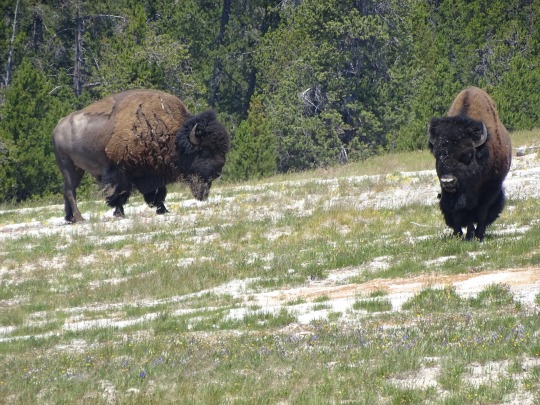
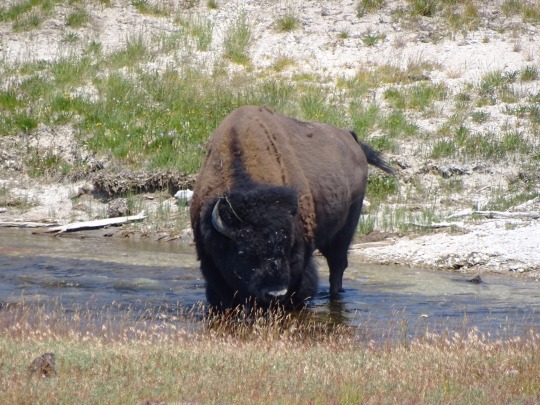
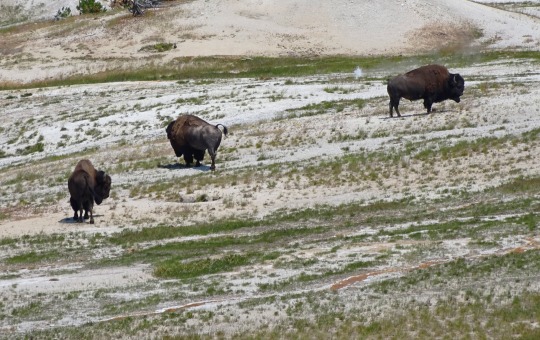
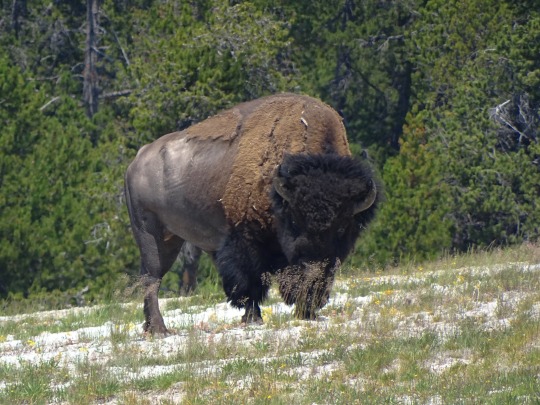

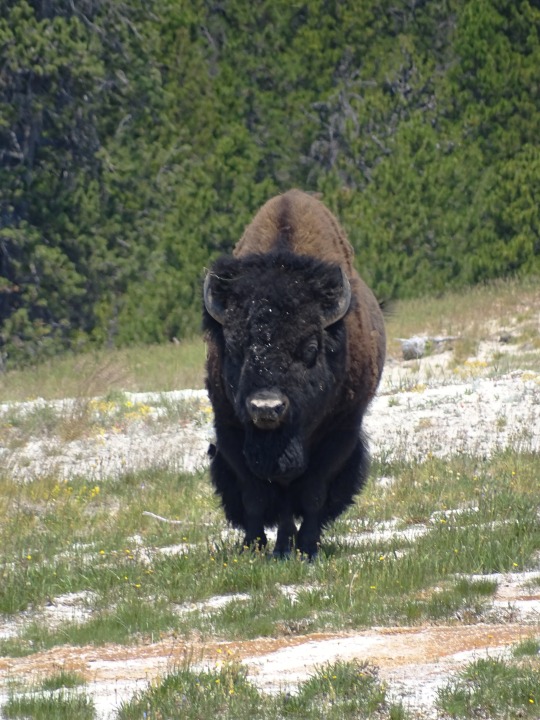
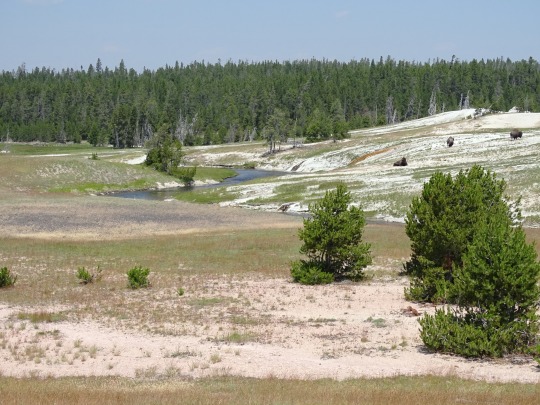
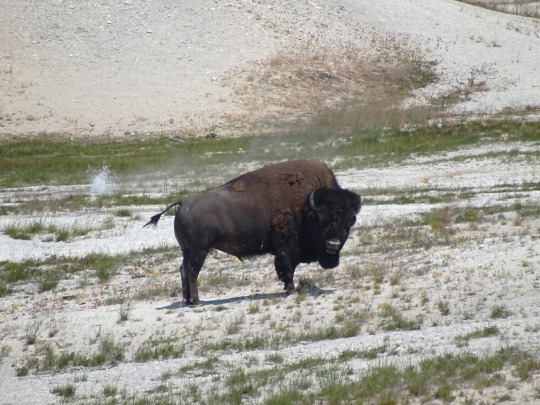
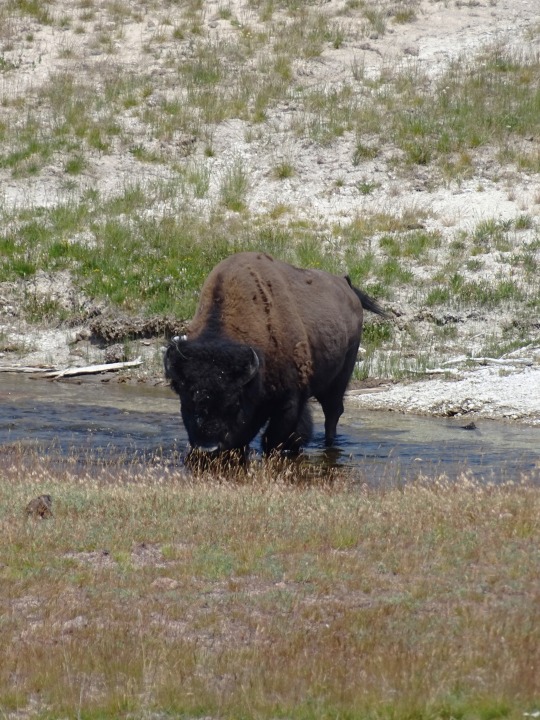
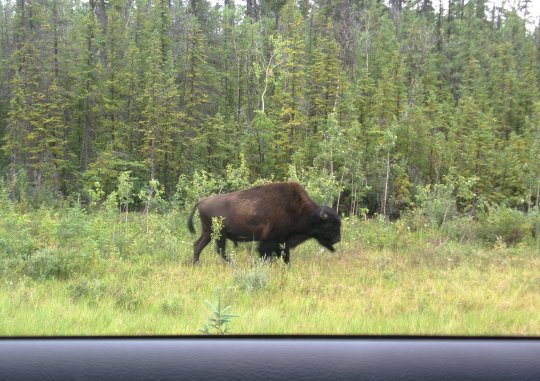
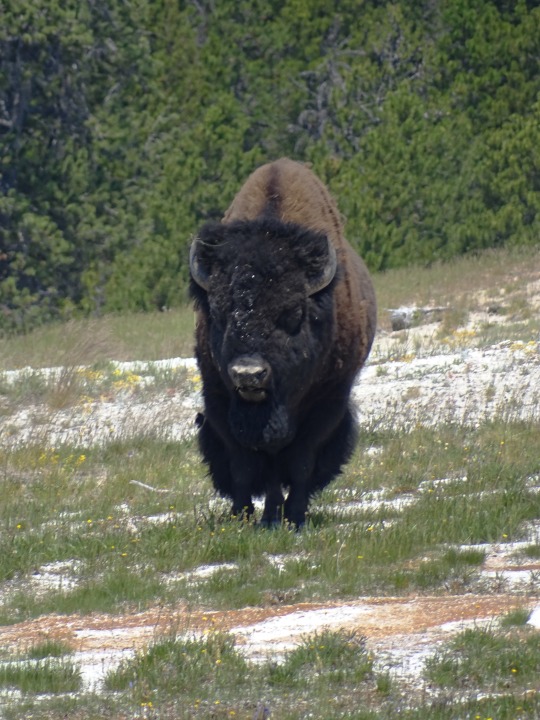
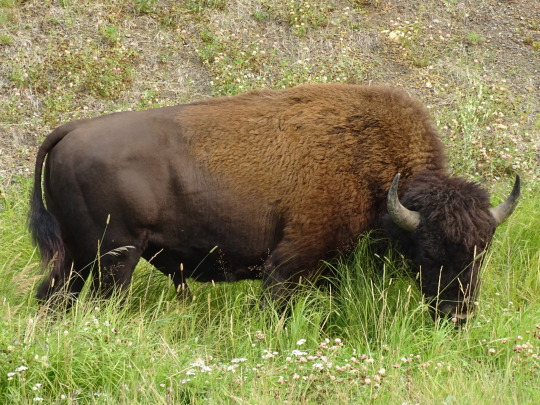
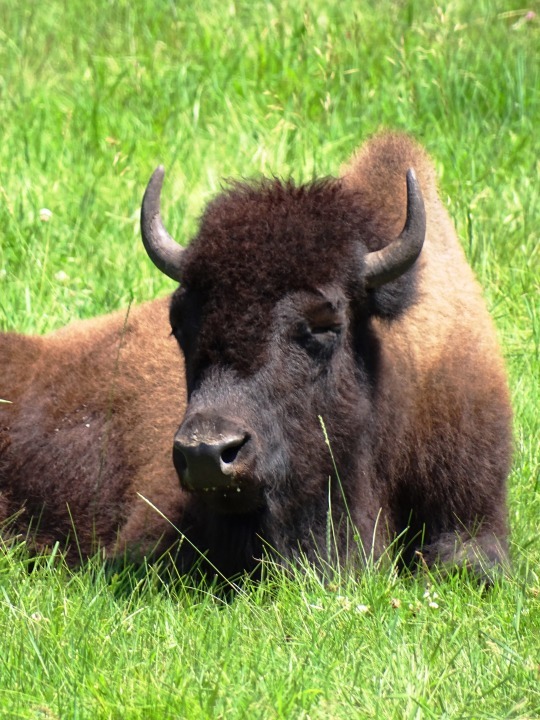
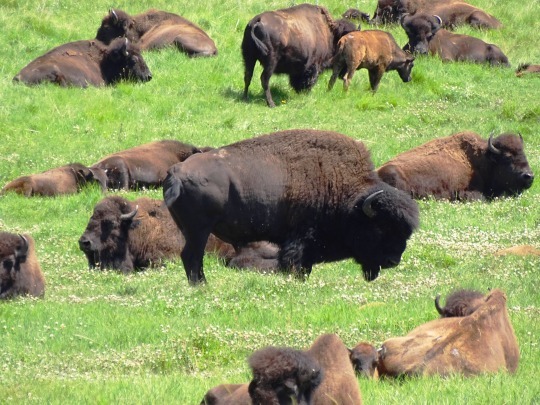
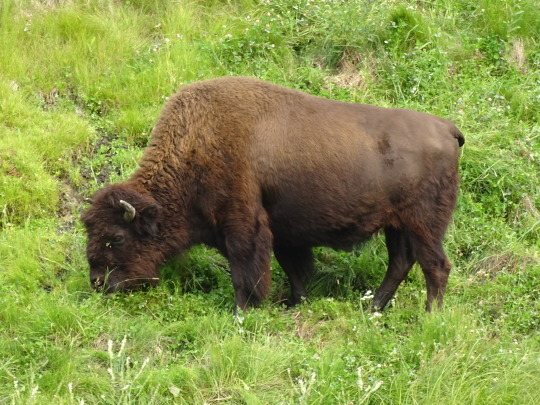
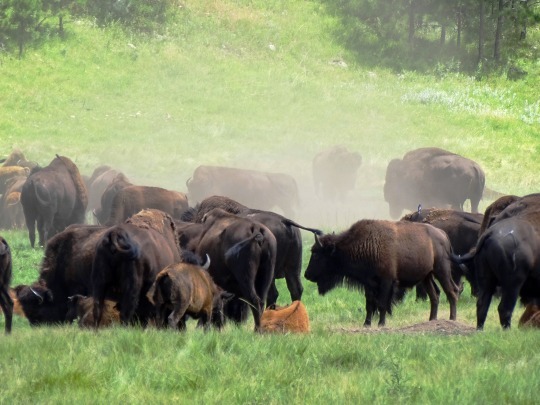
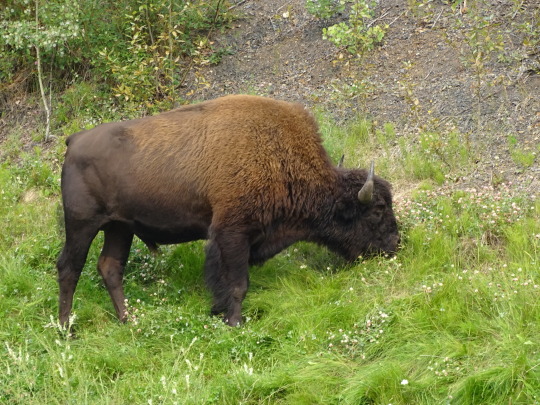
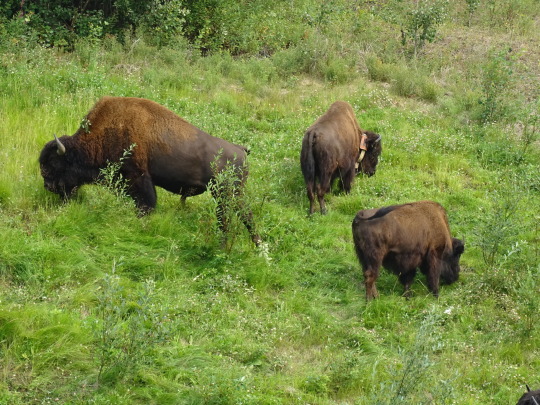
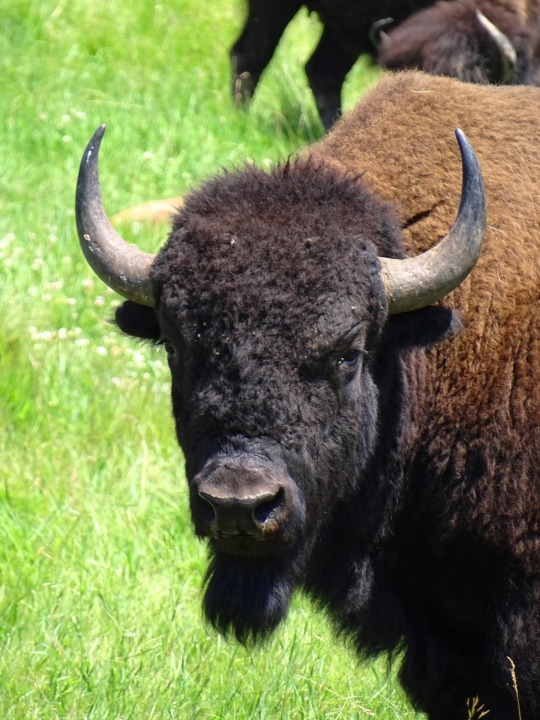

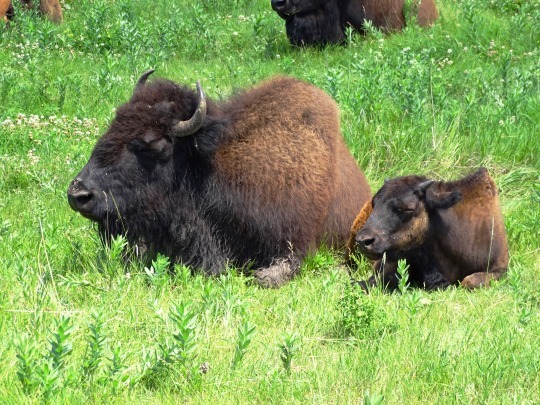
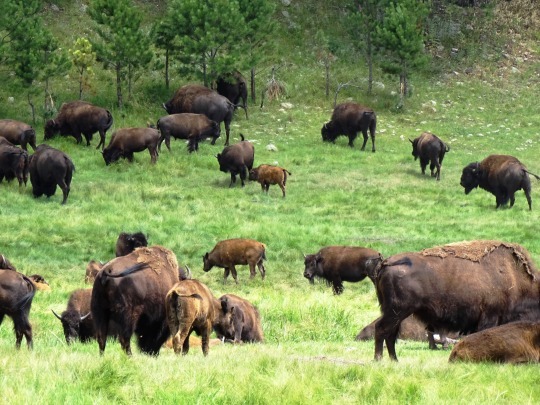
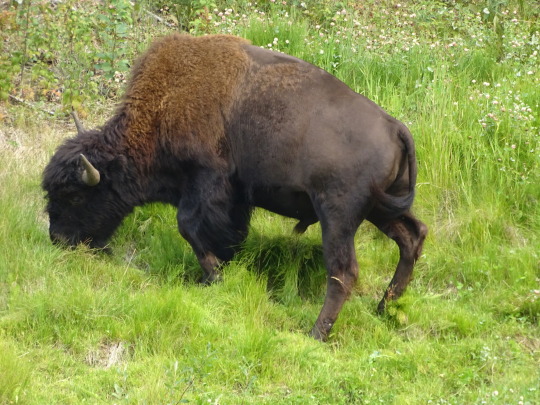
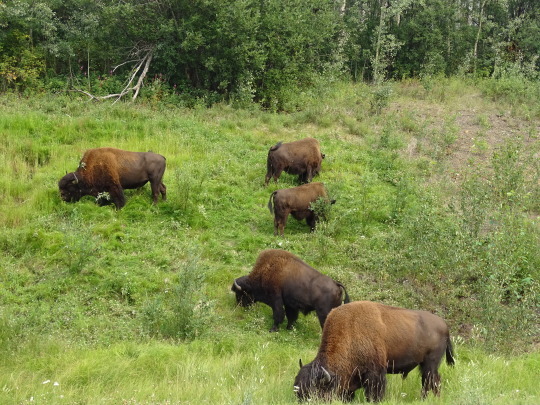
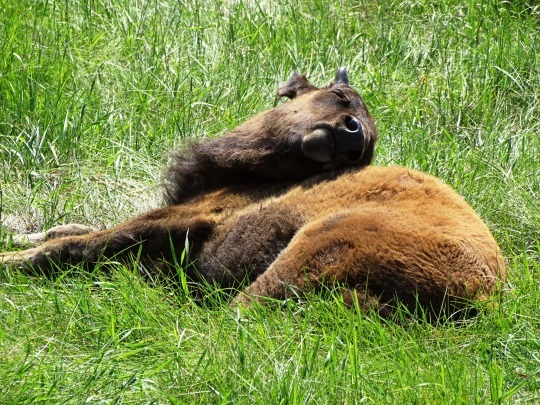
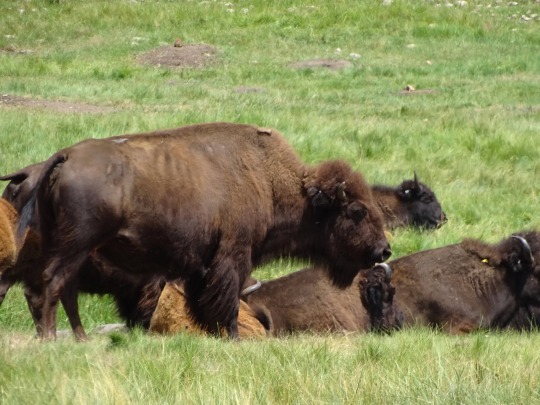
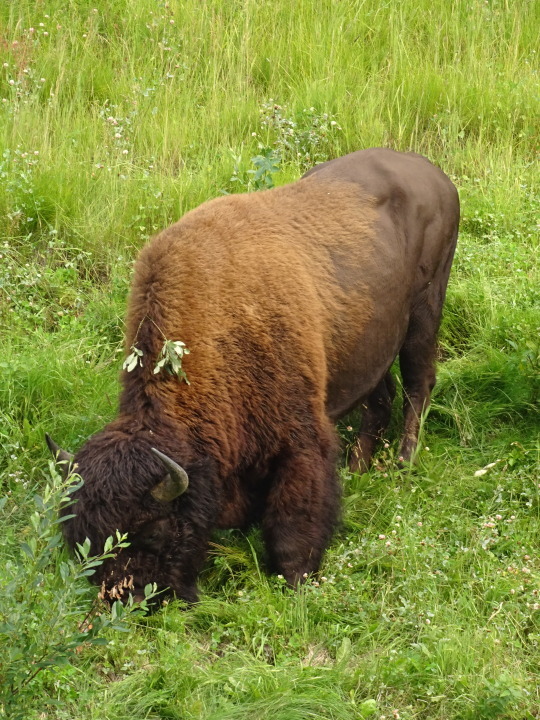
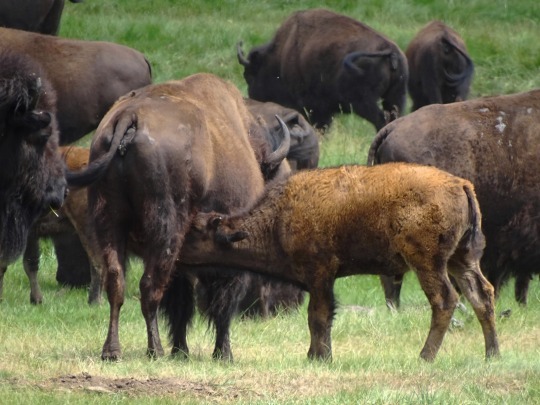
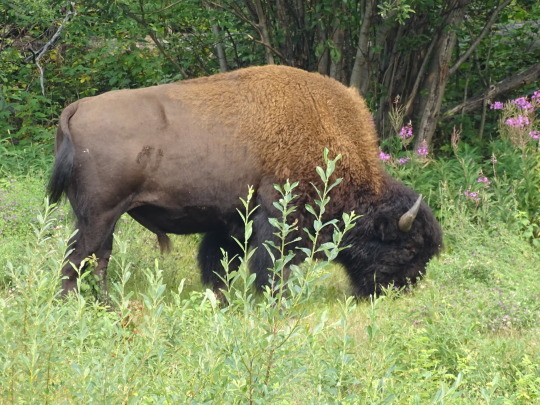
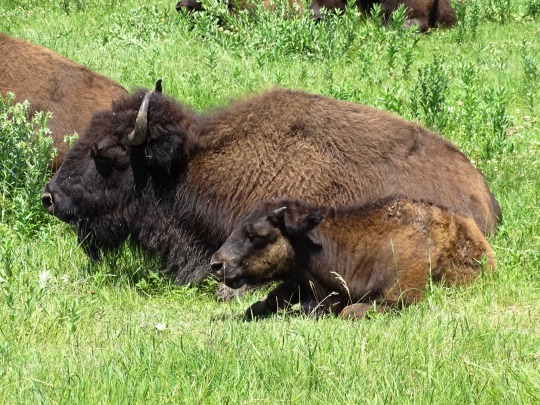
National Bison Day
You see them everywhere — on coins, on sports team logos, and a couple of state flags. No, we’re not talking about the bald eagle. This honor is reserved for North American bison. On National Bison Day, November 2, an annual event that falls on the first Saturday in November, all Americans should reflect on the impact bison have as a part of our environmental and cultural heritage. Bison are especially revered by Native people — central to their survival as both food and spiritual inspiration.
National Bison Day timeline
1900s Bison herds severely reduced due to excessive hunting and abuses
Hunting dramatically reduced the population — leaving a mere 700 in private herds; even Yellowstone was left with only 23 bison by 1902.
1992 Native American tribes formed new group to share resources and help bison
The InterTribal Indian Council formed not only to return bison to tribal lands, but also to create culturally-sensitive educational programs and provide both technical resources and help to 56 tribes.
1997 Groups signed Bison Memorandum of Understanding
The first conservation agreement between an environmental organization and a diverse collective of Native American tribes agreed to combine efforts to return wild bison to tribal land.
2012 The U.S. Senate passed first National Bison Day Resolution
The Senate passed its first resolution honoring National Bison Day, which was also supported by various tribal groups and the Wildlife Conservation Society.
How to Observe National Bison Day
Sign a petition
Visit a national park
Wear your National Bison Day T-shirt
Stand in support of returning wild bison to their original tribal lands on thousands of acres of Native American reservations. Collaborations among certain groups are working to remind Americans about the important role bison play in the lives of native peoples. Bison are considered sacred and they are even featured in certain tribal creation stories. Bison have also been a source of food and clothing — providing hides for tents, robes, shoes, and tools so that people could survive in harsh climates.
You may not be able to get to a large national park like Yellowstone, but there are a vast number of smaller parks from which to choose. Imagine what it must have been like to see thousands of bison freely roaming the plains. Give your children a chance to experience the wonder of our latest national icon — the bison.
Many groups use this day to raise funds in support of bison. It won’t be hard to find a T-shirt showing your love of bison. Wear it proudly because it’s for a great, patriotic cause.
5 Reasons We Love Our Bison
Watch that tail
They've got skills
They're oldies but goodies
Throw a stone — hit a bison
Bison as symbols
If a bison’s tail is hanging down and moves naturally from side to side, the animal is relaxed. But when the tail stands straight up, it's a signal the bison is getting ready to charge.
Given their size as the largest mammals in North America, bison are surprisingly agile with an ability to swim well, jump up to six feet, and run between 35 and 40 mph.
Bison have always roamed in Yellowstone National Park as evidenced by prehistoric fossils found in modern times.
Herds of bison can be found in all 50 states.
The American bison is not only the country's official mammal; the bison is also the state mammal of Wyoming, Oklahoma, and Kansas.
Why National Bison Day is Important
It's our national mammal
They're different from buffalo
They were almost extinct
President Obama, with the support of a broad coalition of Native American tribes, wildlife support groups, and concerned members of the Senate, signed a 2015 law making the proud and majestic bison our national mammal. This law helps to protect bison from extinction and encourages a return back to their native tribal lands.
We know you have been wondering about this so we're going to set you straight. Bison and buffalo are not the same. Bison are native to North and South America and Europe, while the traditional home of the buffalo is in Africa and Asia. At the height of their magnificence, there were between 30 and 60 million bison in the New World circa the 16th century. Today, there are currently half a million bison roaming happily across North America. .
Native peoples once lived their lives around the vast herds of bison that swirled around areas of the west and northwest, the central plains, and the southeastern U.S. Once pioneers started their westward trek, both the Native American tribes and the bison herds were seen as obstacles to progress. As the native peoples were systematically forced off their lands by either poachers or fake government treaties, the bison herds began to disappear; by the early part of last century, bison were on the way to extinction. Today, through the collective efforts of Indian tribes, wildlife associations, the national park system and others, bison have re-emerged as a protected species.
Source
#Yellowstone National Park#Wyoming#Northwest Territories#Wood bison#Yukon#wildlife#Canada#Bison bison athabascae#mountain bison#mountain buffalo#American bison#Bison bison#American buffalo#summer 2024#travel#original photography#vacation#tourist attraction#landscape#countryside#National Bison Day#first Saturday in November#2 November 2024#NationalBisonDay#American Bison#Buffalo#USA#Custer State Park#Black Hills#South Dakota
12 notes
·
View notes
Text
Venezuelan security forces fired tear gas and rubber bullets Monday at protesters challenging the reelection victory claimed by President Nicolás Maduro but disputed by the opposition and questioned abroad.
Thousands of people flooded the streets of several neighborhoods of the capital, chanting "Freedom, freedom!" and "This government is going to fall!"
Some ripped Maduro campaign posters from street posts and burned them.
AFP observed members of the national guard firing tear gas and rubber bullets at protesters, some wearing motorbike helmets and bandannas tied over their faces for protection. Some responded by throwing rocks back.
Maduro, 61, attended a meeting Monday at which the National Electoral Council (CNE) certified his reelection to a third six-year term until 2031.
He dismissed international criticism and doubts about the result of Sunday's voting, claiming Venezuela was the target of an attempted "coup d'etat" of a "fascist and counter-revolutionary" nature.
But opposition leader Maria Corina Machado later told reporters that a review of voting records available so far clearly showed that the next president "will be Edmundo Gonzalez Urrutia," who took her place on the ballot after she was barred by Maduro-aligned courts.
The records showed a "mathematically irreversible" lead for Gonzalez Urrutia, she said, with 6.27 million votes to only 2.75 million for Maduro.
The elections were held amid widespread fears of fraud by the government and a campaign tainted by accusations of political intimidation.
Pollsters had predicted a resounding victory for the opposition.
In the early hours of Monday, the CNE said Maduro had won 51.2 percent of votes cast compared to 44.2 percent for Gonzalez Urrutia.
The opposition cried foul, prompting Attorney General Tarek William Saab to link Machado to an alleged cyber "attack" seeking to "adulterate" the results.
'Another fraud'
The outcome sparked concern and calls for a "transparent" process from the United Nations, United States, European Union and several countries in Latin America.
The CNE has not provided a detailed breakdown of the result.
Allies including China, Russia and Cuba congratulated Maduro.
Gonzalez Urrutia, a 74-year-old former diplomat, on Monday acknowledged the deep discontent in society with the CNE results and vowed that "we will fight for our liberty."
Machado assured Venezuelans that "the leaders of the world" are validating the results, and called families to turn out Tuesday for "popular assemblies" nationwide to show support for a peaceful transition of power.
Nine Latin American countries called in a joint statement Monday for a "complete review of the results with the presence of independent electoral observers."
The US-based Carter Center, one of a few organizations allowed to bring observers into Venezuela, urged the CNE to immediately publish detailed polling station-level results.
Brazil and Colombia also urged a review of the numbers while Chile's president said the outcome was "hard to believe."
Peru recalled its ambassador and Panama said it was suspending relations with Venezuela.
Caracas hit back Monday, saying it was withdrawing diplomatic staff from Argentina, Chile, Costa Rica, Panama, Peru, the Dominican Republic and Uruguay for "interventionist actions and statements."
'Bloodbath' warning
Independent polls had predicted Sunday's vote would end 25 years of "Chavismo," the populist movement founded by Maduro's socialist predecessor and mentor, the late Hugo Chavez.
Maduro has been at the helm of the once-wealthy oil-rich country since 2013. The last decade has seen GDP drop by 80 percent, pushing more than seven million of its 30 million citizens to emigrate.
He is accused of locking up critics and harassing the opposition in a climate of rising authoritarianism.
In the run-up to the election, he had warned of a "bloodbath" if he lost.
Ballots were cast on machines that sent electronic votes directly to a centralized CNE database.
The machines printed out paper receipts that were placed in a container and counted by hand as a backup measure meant to be open to public scrutiny.
The opposition had deployed about 90,000 volunteer election monitors nationwide.
Economic misery
Sunday's election was the product of a deal reached last year between the government and opposition.
That agreement led the United States to temporarily ease sanctions imposed after Maduro's 2018 reelection, rejected as a sham by dozens of Latin American and other countries.
Sanctions were snapped back after Maduro reneged on agreed conditions.
Venezuela boasts the world's largest oil reserves but has seen severely diminished production capacity in recent years.
Most Venezuelans live on just a few dollars a month, and endure biting shortages of electricity and fuel.
Economic misery in the South American nation has been a major source of migration pressure on the southern border of the United States, where immigration is a major presidential election issue.
(AFP)
13 notes
·
View notes
Text

The Invention of Hispanics: What It Says About the Politics of Race
America’s surging politics of victimhood and identitarian division did not emerge organically or inevitably, as many believe. Nor are these practices the result of irrepressible demands by minorities for recognition, or for redress of past wrongs, as we are constantly told. Those explanations are myths, spread by the activists, intellectuals, and philanthropists who set out deliberately, beginning at mid-century, to redefine our country. Their goal was mass mobilization for political ends, and one of their earliest targets was the Mexican-American community.
These activists strived purposefully to turn Americans of this community (who mostly resided in the Southwestern states) against their countrymen, teaching them first to see themselves as a racial minority and then to think of themselves as the core of a pan-ethnic victim group of “Hispanics”—a fabricated term with no basis in ethnicity, culture, or race.
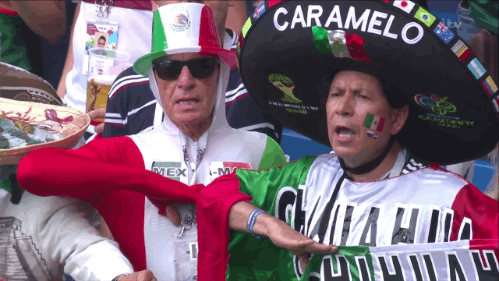
This transformation took effort—because many Mexican Americans had traditionally seen themselves as white. When the 1930 Census classified “Mexican American” as a race, leaders of the community protested vehemently and had the classification changed back to white in the very next census. The most prominent Mexican-American organization at the time—the patriotic, pro-assimilationist League of United Latin American Citizens (LULAC)—complained that declassifying Mexicans as white had been an attempt to “discriminate between the Mexicans themselves and other members of the white race, when in truth and fact we are not only a part and parcel but as well the sum and substance of the white race.”

Tracing their ancestry in part to the Spanish who conquered South and Central America, they regarded themselves as offshoots of white Europeans.
Such views may surprise readers today, but this was the way many Mexican Americans saw their race until mid-century. They had the law on their side: a federal district court ruled in In Re Ricardo Rodríguez (1896) that Mexican Americans were to be considered white for the purposes of citizenship concerns. And so as late as 1947, the judge in another federal case (Mendez v. Westminster) ruled that segregating Mexican-American students in remedial schools in Orange County was unconstitutional because it represented social disadvantage, not racial discrimination.
At that time Mexican Americans were as white before the law as they were in their own estimation.

The process would only work if Mexican Americans “accepted a disadvantaged minority status,” as sociologist G. Cristina Mora of U.C. Berkeley put it in her study, Making Hispanics (2014). But Mexican Americans themselves left no doubt that they did not feel like members of a collectively oppressed minority at all. As Skerry noted, “[the] race idea is somewhat at odds with the experience of Mexican Americans, over half of whom designate themselves racially as white.” Even in the early 1970s, according to Mora, many Mexican-American leaders retained the view that “persons of Latin American descent were quite diverse and would eventually assimilate and identify as white.” And yet “Spanish/Hispanic/Latino” is now a well-established ethnic category in the U.S. Census, and many who select it have been taught to see themselves as a victmized underclass. How did this happen?
In other words, a distinctive set of beliefs, customs, and habits supported the American political system. If the Cajun, the Dutch, the Spanish—and the Mexicans—were to be allowed into the councils of government, they would have to adopt these mores and abandon some of their own. It is hard to argue that this formula has failed. Writing in 2004, political scientist Samuel Huntington reminded us that
“Millions of immigrants and their children achieved wealth, power, and status in American society precisely because they assimilated themselves into the prevailing culture.”
Indeed, merely calling Mexican-Americans a ‘minority’ and implying that the population is the victim of prejudice and discrimination has caused irritation among many who prefer to believe themselves indistinguishable [from] white Americans…. [T]here are light-skinned Mexican-Americans who have never experienced the faintest…discrimination in public facilities, and many with ambiguous surnames have also escaped the experiences of the more conspicuous members of the group.”
Even worse, there was also “the inescapable fact that…even comparatively dark-skinned Mexicans…could get service even in the most discriminatory parts of Texas,” according to the report. These experiences, so different from those of Africans in the South or even parts of the North, had produced
a long and bitter controversy among middle-class Mexican Americans about defining the ethnic group as disadvantaged by any other criterion than individual failures. The recurring evidence that well-groomed and well-spoken Mexican Americans can receive normal treatment has continuously undermined either group or individual definition of the situation as one entailing discrimination.
It is incumbent on us to pause and note exactly what these UCLA researchers were bemoaning. Their own survey was revealing that Mexican-Americans’ lived experiences did not square with their being passive victims of invidious, structural discrimination, much less racial animus. They owned their own failures, which—their experience told them—were remediable through individual conduct, not mass mobilization. Their touchstones were individualism, personal responsibility, family, solidarity, and independence—all cherished by most Americans at the time, but anathema to the activists.
The study openly admitted that reclassification as a collective entity serves the “purposes of enabling one to see the group’s problems in the perspective of the problems of other groups.” The aim was to show “that Mexican Americans share with Negroes the disadvantages of poverty, economic insecurity and discrimination.” The same thing, however, could have been said in the late 1960s of the Scots-Irish in Appalachia or Italian Americans in the Bronx. But these experiences were not on the same level as the crushing and legal discrimination that African Americans had faced on a daily basis. That is why the survey respondents emphasized “the distinctiveness of Mexican Americans” from Africans and “the difference in the problems faced by the two groups.” The UCLA researchers came out pessimistic: Mexican Americans were “not yet easy to merge with the other large minorities in political coalition.”
Thereafter, militants from La Raza, MALDEF, and other organizations put pressure on the Census Bureau to create a Hispanic identity for the 1980 Census—in order, as Mora puts it, “to persuade them to classify ‘Hispanics’ as distinct from whites.”
The Hispanic category was a Frankenstein’s monster, an amalgam of disparate ethnic groups with precious little in common.
The 1970 Census had included an option to indicate that the respondent was “Mexican, Puerto Rican, Cuban, Central or South American, [or] Other Spanish.” But re-categorizing Mexican Americans and lumping them in with other residents of Latin American descent under a “Hispanic American” umbrella was a necessary move, Mora writes, because “this would best convey their national minority group status.”
The law states that “a large number of Americans of Spanish origin or descent suffer from racial, social, economic, and political discrimination and are denied the basic opportunities that they deserve as American citizens.” The very thing that defined Hispanics was victimhood.
IT IS SHOWN THAT THE HUMAN CATEGORY "WHITE" WAS BUILT UPON THE IDEA OF THAT BRITISH AS WHITE, CHRISTIAN, OF THEIR ESSENCE FREE,AND DESERVING OF RIGHTS AND PRIVILEGES FROM WHICH THOSE INSUFFICIENTLY BRITISH -LIKE COULD BE DENIED. JACQUELINE BATTALORA "BIRTH OF A WHITE NATION.
#hispanics#latina#afro latina#curvy latina#latin girls#latinx#sexy latina#thick latina#latino#kemetic dreams#brownskin#brown skin#mexican#mexicana#mexico#mexique#mextagram#white#black and white#white house#census data#censura#qsmp census bureau#u.s. census bureau#tumblr censure#the invention of the Hispanic#african#afrakan#afrakans#africans
74 notes
·
View notes
Text
Mayor Eric Adams’ administration is promoting reparations in a bid to curb health and wealth disparities of black New Yorkers — but the effort is being met with accusations that it’s “sowing racial divisiveness,” The Post has learned.
The proposal for federal reparations is spelled out in a bombshell report from the city’s Department of Health and the Federal Reserve Bank entitled “Analyzing the Racial Wealth Gap and Implications for Health Equity.”
“The goal of a [federal] reparations program would be to seek acknowledgment, redress, and closure for America’s complicity in federal, state, and local policies … that have deprived black Americans of equitable access to wealth and wealth-building opportunities,” the report said.
The city’s Health Commissioner Dr. Ashwin Vasan and his team offered three key recommendations including: a fresh approach to public health policy, how to improve data collections on wealth and health outcomes and getting the community more involved with health care decisions.
But moderate and conservative politicians opposed to reparations accused Adams’ health minions of turning into ideologues and social justice activists instead of doing their jobs.
“Add reparations and sowing racial divisiveness to the list of greatest policy hits by Commissioner Vasan’s and his health department, right alongside the crack pipe vending machine, heroin ‘empowerment’ signs on subways, firing unvaccinated city workers, supporting government drug dens; and banning unvaccinated kids from sports,” fumed Council Republican Minority Leader Joe Borelli (R-Staten Island).
The New York legislature approved a commission to address economic, political and educational disparities by black people in June and follows the lead of California, which became the first state to form a reparations task force in 2020.
New York Assembly Speaker Carl Heastie, the first black person to hold the position, called the legislation “historic.”
Adams has previously expressed support for the commission which is awaiting Hochul’s signature.
“We have consistently brought together experts to discuss a variety of ideas to promote equity in our city and we will continue to do so,” said the Health Department’s spokesman.
“We have an obligation to help New Yorkers lead longer, healthier lives.”
As with most progress in this system, we have to first inspect its ongoing involvement in pro enslavement systems. Not only did the historical ties to the Trans-Atlantic-slave trade leave on going structural residual connections that linger in our society today, it continues to exist in the 13th amendment's clause: slavery illegal unless a crime was found on you. That "unless" aspect made it essentially persist as is under the guise of hyper-criminalization at a system level. This has had adverse, negative effect on everyone including the environment. These are facts that can be proven. Not just social justice counter points. Besides, we are literally (regardless of what we say about it) immersed in politics and social justice through our lived social experiences. Claiming "the social justice advocates are the issue for pointing out what exists" is not helpful and adds to the lack of communal education required to understand these things. We need problack proindigenx reperations and restituion.
#health#wealth#disparity#equity#science#heal department#reparations#trans atlantic slave trade#white supremacy#black people#federal#ny#nyc#america
55 notes
·
View notes
Text
Hapy St. Patrick's Day.
"More than with most famines, this is an avoidable catastrophe. With its restrictions on the distribution of food aid, water, and medical supplies, Israel is manifestly causing famine as it wages war. In this, it is facilitated by the United States, which continues to arm Israel and give it political cover through the use of its veto at the UN Security Council.
In recent US announcements, there is a measure of recognition of the gravity of the situation in Gaza, but the practical measures which followed are inadequate. Air-drops will not stop famine; nor will the proposed maritime corridor between Cyprus and Gaza relieve starvation on the necessary scale.
On this St. Patrick’s Day in an election year, we are appealing to the conscience of Irish America. We ask Irish Americans in their capacity as citizens, as members of cultural and benevolent societies, as political leaders, to use their influence to avert a Famine as severe as the one faced by their ancestors. To do this it is necessary that the United States ceases arming Israel; that it puts pressure on Israel to halt its military action and lifts its blockade on Gaza; that it refrains from using its veto at the UN security council in relation to Palestine; that it restores funding to UNRWA, the agency best-equipped to provide relief; that it acts as an honest broker to bring about an agreed political settlement between Israel and Palestine."
20 notes
·
View notes
Text
When US President Nixon wanted to read about {Islamic Fundamentalism}, he asked American intelligence to prepare a study for him on that subject, but their research was long, so he asked his advisor, Richard Crane, to read the research and summarize it for him. Robert Crane, or Richard Crane, was the president’s advisor. Nixon's American Foreign Affairs Officer, holds a doctorate in public law and a doctorate in international and comparative law, is president of the Harvard Society for International Law, deputy director of the National Security Council at the White House, and was one of America's leading political experts in general. Robert read the long intelligence paper to summarize it for the president, then went to attend Islamic seminars and lectures to learn more about the subject. Only a few days passed...until the news of Robert Crane's conversion to Islam spread throughout the entire United States of America. He called himself Farouk Abdul Haq, based on Farouk Omar, may God be pleased with him. He says about the reason for his conversion to Islam: As a student of the law... I found in Islam all the laws that I studied... and even during my studies at Harvard University for 3 years... I did not find in their laws the word (justice). ) Even once, I found this word in Islam often. He also said: We were in a legal dialogue, and there was one of the Jewish law professors with us. He started speaking and then started delving into Islam and Muslims, so I wanted to silence him.. So I asked him: Do you know the size of the inheritance law in the American Constitution? He said: Yes, more than eight volumes. I said to him: If I brought you a law for inheritance in no more than ten lines, would you believe that Islam is a true religion? He said: This cannot be. So I brought him the verses on inheritance from the Holy Qur’an and presented them to him. He came to me after several days and said to me: It is not possible for a human mind to count all the kinship relationships with such comprehensiveness that does not forget anyone and then distribute the inheritance among them with such justice that does not oppress anyone.. Then this Jewish man converted to Islam.!! After Dr. Farouk Abdel Haq converted to Islam, he began to criticize the West for its biased and inadequate view of Islam. He criticized Muslims who did not understand or apply Islamic teachings, and he used to say: Many Muslims who live in the West do not practice or live according to the teachings of Islam. Dr. Farouk Abdel Haq Robert Crane, previously, passed away on December 12, 2021, at the age of 92. We ask God Almighty to forgive him and have mercy on him.

#palestine#gazaunderattack#gaza#free palestine#israel is a terrorist state#gaza hospital#غزة تحت القصف#فلسطين#طوفان الاقصي#غزة
9 notes
·
View notes
Text
WASHINGTON – Four weeks before U.S. President-elect Donald Trump takes power, all his rhetoric and appointments are indicating that his campaign's vow to crack down on pro-Palestinian sentiment in America will be a defining factor of his administration's early days.
Throughout the campaign, both Trump and the Republican Party insisted that such a clampdown would be quick and complete. After Trump's speedy cabinet appointments and ahead of a Congress ruled by a GOP majority, the fight against the pro-Palestinian movement might be one of the only things that has a clear path across the government.
Once Trump's picks for the top diplomatic positions are in place, such as Marco Rubio as secretary of state and Elise Stefanik as UN ambassador, the harshest step – the deporting of pro-Palestinian protesters who have student visas – could be the first move. Both Rubio and Stefanik are well-known proponents of such a step, one of Trump and the GOP's few solid policy commitments on the Israeli-Palestinian conflict during the campaign.
In October, Rubio wrote to the current secretary of state, Antony Blinken, urging him to "immediately perform a full review and coordination effort to revoke the visas of those who have endorsed or espoused Hamas' terrorist activity."
Stefanik, meanwhile, has doubled down on her star-making turn as university-president interrogator by calling for students' deportation. She told Fox News in May that these students "are pro-Hamas members of a mob who are calling for the eradication of Israel. They are calling for genocide against Jews around the world and in America. It is unthinkable that we are allowing this to happen at U.S. universities."
The blueprint is there
Other nominees more focused on domestic matters have also suggested that the pro-Palestinian protest movement will be a key issue. Among them is Pam Bondi, Trump's second attempt at a nominee for attorney general. The former Florida attorney general has called for a revocation of visas and condemned the campus protests.
The thing that's really the most troubling to me [are] these students in universities in our country, whether they're here as Americans or if they're here on student visas, and they're out there saying 'I support Hamas,'" she told Newsmax last year.
Bondi added: "Frankly they need to be taken out of our country or the FBI needs to be interviewing them right away."
Trump's choice to lead the FBI is controversial loyalist Kash Patel. While the former federal prosecutor doesn't have much of a record on campus protests, he is most notorious for his desire to remove any of Trump's critics and doubters from the national security apparatus.
Further, Patel's experience as the National Security Council's senior director of counterterrorism during Trump's first term positions him to crack down on pro-Palestinian sympathizers. A blueprint for this is detailed in Project Esther, a plan to combat antisemitism unveiled by the Heritage Foundation, which is behind Project 2025, the 922-page paper outlining conservatives' plans to fundamentally alter the government.
The underlying thesis of Project Esther – a more tractable 33 pages – is that "America's virulently anti-Israel, anti-Zionist, and anti-American 'pro-Palestinian movement' is part of a global Hamas Support Network (HSN)."
The task force's mission statement calls for a coalition to "dismantle the infrastructure" that purportedly sustains the alleged network. This would take one to two years. "Supported by activists and funders dedicated to destroying capitalism and democracy, the HSN benefits from the support and training of America's overseas enemies," the document states.
It adds that this network "seeks to achieve its goals by taking advantage of our open society, corrupting our education system, leveraging the American media, coopting the federal government, and relying on the American Jewish community's complacency."
The document suggests how a potential Trump administration would crack down on protesters, something he has promised. It also calls for the deporting of protesters in the United States on student visas and the targeting of universities' tax-exempt status. It notes laws that might "exploit [the network's] vulnerabilities," require representatives of foreign entities to disclose their connections, and target organized crime and racketeering.
Hardliner Harmeet Dhillon
One bill that will not be in the law books anytime soon is the Antisemitism Awareness Act, which is aimed at combating campus antisemitism. It also requires the Education Department to take the International Holocaust Remembrance Alliance definition of antisemitism into account when determining if an action or practice that violates Title VI of the 1964 Civil Rights Act was motivated by antisemitism.
The House of Representatives overwhelmingly passed the act earlier this year, despite concerns on the left that criticism of Israel would be conflated with antisemitism and on the right that the bill had dramatic implications on freedom of speech. There were also tropes from far-right Republicans that the bill would state that Jews killed Jesus.
Outgoing Senate Majority Leader Chuck Schumer has kept the bill off the Senate floor for a vote by attaching it to various other packages that he hopes to push through.
Amid this stalemate, another notable opponent has emerged: Harmeet Dhillon, Trump's choice to lead the Justice Department's Civil Rights Division, which will play a major role in enforcing federal action combating antisemitism.
Dhillon, one of Trump's top legal minds behind his efforts to challenge the 2020 election results, slammed the Antisemitism Awareness Act upon its House passage. "I have been a First Amendment and religious liberties lawyer for minority and majority faith communities for decades and this bill is knee-jerk anti-constitutional dreck," she wrote on X.
She added: "Do better, think harder, and be smarter, Congress. 'Hate speech' laws are a liberal concept." But Dhillon has joined her new colleagues in being a vocal advocate for cracking down on the campus protest movement.
"Sue Yale," she wrote on X in April. "Sue every university that refuses to keep students safe based on their religion. Make them regret their choices. Deplete their endowments. Sue each and every violent protester and organizers. Drain their bank accounts. Sow salt in their career plans."
Dhillon followed that post by laying into a protest at UCLA: "I defend the right of these jackass terrorist apologists to protest, but they do NOT have the right to block access to other students or prevent them from going to class. My tax dollars are subsidizing UCLA and the Regents need to get their act together ASAP or be sued!"
Linda McMahon, Trump's education secretary nominee, has also publicly committed to prioritizing the issue, even if the incoming president has vowed to dismantle her department.
"Certainly. I don't think we should have any kind of discrimination anywhere, and I absolutely abhor any kind of violence that we have seen on campus. It should not be allowed," she told Jewish Insider without specifying what plan she supports. "We have lots of priorities that I'm going to be dealing with, and certainly anything that is against the safety and welfare of any of our students will be a priority."
The proposed defunding of the Education Department is perhaps the plank in Project 2025 that most concerns the American-Jewish community. The Office of Civil Rights, which is responsible for investigating and adjudicating allegations of antisemitism, is part of this department and has opened at least 145 investigations into such complaints.
Hardliner Brian Mast
This past summer, a rare coalition of nearly two dozen Jewish organizations across the political and denominational spectrum urged Congress to "provide the highest possible funding" for the Office of Civil Rights, despite the deep disagreements regarding antisemitism on Capitol Hill and in the Jewish world.
House Republicans, though they deemed the office's funding insufficient, voted to cut $10 million more after accusing it of failing to prioritize antisemitism. Several Trump-allied Republicans have also highlighted the office's role in culture war issues like Title IX and what they call "forcing women to compete against males in sports."
Holding a razor-thin majority and already plagued by infighting, the House GOP might find that advancing legislation relating to the Palestinians is the only influential work it can get done in the next session of Congress.
In a surprise development, Rep. Brian Mast has been slated to chair the House Foreign Affairs Committee after Trump advocated on his behalf. The Florida congressman has long been considered the U.S. lawmaker most hostile to the Palestinians. He has decried efforts to bolster humanitarian aid for Gaza and dismissed the notion of innocent Palestinian civilians.
"I don't think we would so lightly throw around the term 'innocent Nazi civilians' during World War II. It is not a far stretch to say there are very few innocent Palestinian civilians," he said in remarks that led to an unsuccessful effort in the House to formally rebuke him.
Mast, an evangelical Christian, once volunteered with the Israeli military, and he wore his uniform in Congress in the days after the October 7 attack. That was a way to protest Rep. Rashida Tlaib's placing of a Palestinian flag outside her office.
Mast has also condemned the concept of a two-state solution while spearheading legislation to permanently cut U.S. funding for the UNRWA refugee agency, among other hostile bills. He has also slammed U.S. efforts to secure a cease-fire in Gaza and advocated for expedited and expanded weapons sales to Israel.
25 notes
·
View notes
Text
OKAY OKAY I COULDN'T CONTAIN MYSELF
A man or a monster.
Yoshi and Shen have 3 children together: Yoshi II, the oldest, representing the bond between the clan and the yokai, and little Chisenshiro, an homage to the sacred name and to the little boy Yoshi grew up with.
For a long time things were good and chill, so pacific in fact that some of the clansmen were leaving for the modernity of the city. Not many, but it was clear that since their mission wasn't as proeminent as before, times of peace allowed them to leave without facing guilt or banishment. Yoshi grew to be a good and loving father, and a specially protective husband.
It's because things were good that the tragedy felt all the more painful.
Shen sensed a disturbance in the air first. For days she left the mountains to look for the source of the threat. There was something wrong, she told Yoshi, and she knew he could feel it too. But how the fuck would they explain that? He couldn't exactly summon his warriors because of a hunch. He tried, but the council argued he was being paranoid since the times were of peace.
Well, that blew up on their faces when the fucking Shredder came around with an army of corrupted humans and yokai alike and proceeded to wipe out every single Hamato on sight. He killed elders, women, children. Babies. The warriors, samurai and ninja, tried to put up a fight, but his power was unmatched. Yoshi hadn't known it was an attack. For all he knew his little brother had come to see him after all this time. He'd been excited and hopeful, and that hope blinded him to Saki's true intentions.
Yoshi barely survived, his children had to do most of the fighting to keep their family alive, and Shen carried all of them away from the massacre ocurring with the help of her father in law, Riku. Chiseburo, his wife, had been the first one victim to the Shredder as she saw through his façade.
They hid in the forest, having to move often to avoid capture from the army the Shredder had sent after them, settling in the city with an old member of the clan that had left before the incident. Life in the city was specially hard for Shen and the kids, as they were still part yokai and needed to be connected to their roots. The boys could grow used to the lack of energy they felt for the broken connection, but Shen grew weaker by the day and no one knew if she would survive. Nobody had made a pact like Yoshi and Shen's before.
And that wasn't the only problem. The moment of relative safety was cut short when they received a message from Shredder declaring war against japan unless Hamato Yoshi and his family - all of the people who had left the clan too - came forward to face him. They were hopeless.
Until Yoshi found about an american organization specialized in detaining dangerous supernaturals to keep the lives of humans as normal and mystic free as possible. He connected to them and asked for help, but it wouldn't be simple as that, as they couldn't just trust a random guy from half the world away. With a heavy heart Yoshi said goodbye to his family and promised they'd be whole again. He would be back. Shen allowed him to go, but as soon as he left, her spirit collapsed and she fell into a deep sleep.
In America the organization put Yoshi through all sort of test and trial to prove his story because, unbeknownst to him, Saki had made himself a very respectable public figure in japanese society. They accepted his request for help only after he proved that he himself wasn't just a delusional lunatic and showed his powers.
The look in agent conducting his case as he heard Yoshi's retelling of what happened gave him a bad foretelling, but he forced it down as he promised they'd work on his case.
If he in turn worked for them.
Forbidden from contacting his family by any means, and unable to feel them in his soul, JY0B2's mind withered and deteriorated to the point he was barely human. He spent years being subjected to tests, sent to violent missions, used as a hit man; and experiment after experiment, his memory of the reason he was there faded only more and more, to the point he couldn't remember what life outside had been.
After a mission that almost ended his life he hid in the sewers aiming to go back to base after he lost his enemies but found his injuries were too severe do that. He spent 3 days in the sewers, where he found something. A small rat. In the back of his mind he remembered that yokai had a connection to animals and he was part yokai, and in the back of his mind he remembered a stunning Jorogumo saying she'd devour his flesh like a black widow eats a rat, but it was all blurry and confusing. He called the rat Yoshi. It felt right. And when he went back to base, he still had the animal with him.
"It's fine, Yoshi." He said, laying in his cell and stroking the rodent's furr. It squeaked. "I promise I'll bring you back to your family in my next mission. I just don't want to be alone now."
That promise he wouldn't break.
-----------------------------------------
Bro I fr am enjoying writing this shit. What the actual fuck. I LOVE IT. Also, finally, we see a glimpse of Splinter. Is Yoshi gonna mutate? Or is it JY0B2? I WONT TELL YA HEHEHEHEHEHEH
BUT I am workin on art for the pathetic lil man so there's that. And his rat friend. And also the monster wife, I made her extra hot and extra dangerous.
10 notes
·
View notes
Text
In Mexico and Brazil, Anti-Corruption Efforts Seem to Have Faded
Policies to fight graft are a low priority in both countries and have lost momentum in the region as a whole.

Despite a wave of headline-making corruption cases, the hard truth is that most Latin American governments have relegated anti-graft measures to a lower priority in recent years, while voters have been less active and mobilized around the issue. With a few exceptions—as in Guatemala last August—anti-corruption pledges no longer define Latin American elections.
This is especially true in the region’s two most populous countries, Brazil and Mexico, which last decade showed glimpses of hope through high-profile corruption investigations such as Operation Car Wash. Yet, more recently, they have struggled with entrenched corruption and limited political will to tackle related issues. Over the past five years, both countries have faced a particularly troublesome road in the fight against corruption as measured by the Capacity to Combat Corruption (CCC) Index, co-published by Control Risks and the Americas Society/Council of the Americas (which publishes AQ). The index evaluates and ranks 15 Latin American countries based on their ability to detect, punish and prevent corruption.
In the 2023 CCC Index, Brazil’s score stabilized just above the regional average, while Mexico’s fell for the fourth consecutive year. (The next edition of the CCC Index is set to be published in 2025.) In both countries, rhetoric against corruption has proven stronger than their capacity to combat it.
Continue reading.
#brazil#brazilian politics#politics#mexico#mexican politics#corruption#image description in alt#mod nise da silveira
4 notes
·
View notes
Photo
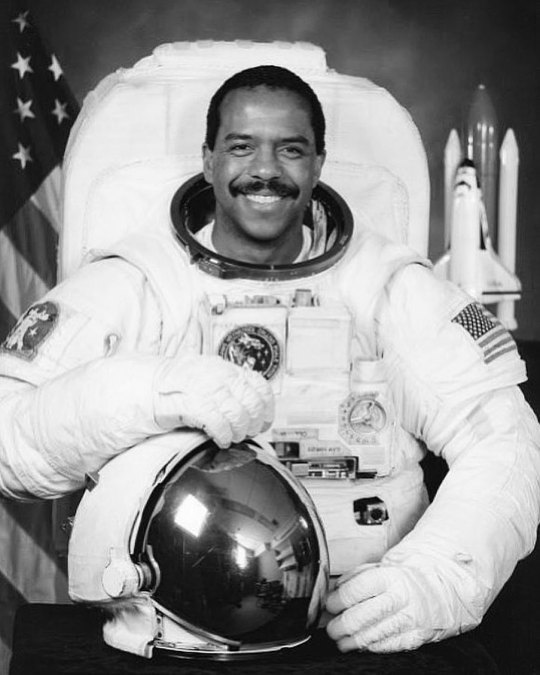
Today In History Dr. Bernard A. Harris, Jr. became the first African American astronaut to take a spacewalk on this date February 9, 1995. Harris, Jr. was the Payload Commander on STS-63 (February 2-11, 1995)—the first flight of a joint space program. Special Honors: 1996 Honorary Doctorate of Science, Morehouse School of Medicine. Medal of Excellence, Golden State Minority Foundation 1996. NASA Award of Merit 1996. NASA Equal Opportunity Medal 1996. NASA Outstanding Leadership Medal 1996. The Challenger Award, The Ronald E. McNair Foundation 1996. Award of Achievement, The Association of Black Cardiologists 1996. Space Act Tech Brief Award 1995. Alpha Omega Alpha Medical Honor Society, Zeta of Texas Chapter 1995. Election of Fellowship in the American College of Physicians 1994. Distinguished Alumnus, The University of Houston Alumni Organization 1994. Distinguished Scientist of the Year, ARCS Foundation, Inc., 1994. Life Membership, Kappa Alpha Psi Fraternity. NASA Space Flight Medals 1993, 1995. NASA Outstanding Performance Rating 1993. JSC Group Achievement Award 1993. Physician of the Year, National Technical Association, 1993. Achiever of the Year, National Technical Association, 1993. American Astronautical Society Melbourne W. Boynton Award for Outstanding Contribution to Space Medicine 1993. Achievement Award, Kappa Alpha Psi Fraternity 1993. Who’s Who Among Rising Young Americans Citation 1992. Certificate of Merit, Governor of Texas 1990. City of San Antonio Citation for Achievement 1990. NASA Sustained Superior Performance Award 1989. NASA Outstanding Performance Rating 1988. NASA Sustained Superior Performance Award 1988, 1989. National Research Council Fellowship 1986, 1987. Phi Kappa Phi Honor Society 1985. Outstanding Young Men of America 1984. University of Houston Achievement Award 1978. Achievement Award 1978. CARTER™️ Magazine carter-mag.com #wherehistoryandhiphopmeet #historyandhiphop365 #cartermagazine #carter #drbernardharris #blackhistorymonth #blackhistory #history #staywoke https://www.instagram.com/p/CocIi73OeUc/?igshid=NGJjMDIxMWI=
#wherehistoryandhiphopmeet#historyandhiphop365#cartermagazine#carter#drbernardharris#blackhistorymonth#blackhistory#history#staywoke
77 notes
·
View notes